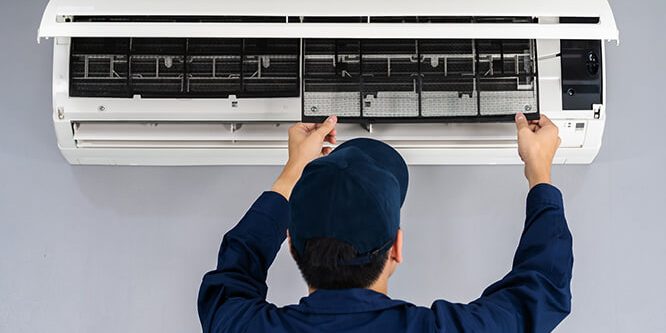Air Conditioning Replacement Service play a crucial role in maintaining comfort and efficiency in modern homes. As temperatures rise, the demand for effective cooling solutions becomes more apparent. Timely air conditioning replacement not only ensures optimal performance but also brings numerous benefits such as improved energy efficiency, enhanced comfort, and increased home value. This guide explores everything you need to know about air conditioning replacement services.
Understanding Air Conditioning Systems
Types of Air Conditioning Systems
Air conditioning systems come in various types, each with its unique advantages:
- Central Air Conditioning Systems: These systems cool the entire home through a network of ducts. They are known for their powerful cooling capacity and uniform temperature distribution.
- Ductless Mini-Split Systems: Ideal for homes without existing ductwork, these systems offer flexibility by allowing individual room control. They are energy-efficient and easy to install.
- Window Units and Portable Air Conditioners: These are perfect for cooling individual rooms. While less efficient than central systems, they are cost-effective and easy to move.
How Air Conditioning Systems Work
Air conditioning systems operate on basic principles of heat transfer and thermodynamics. They consist of key components such as the compressor, condenser, evaporator, and refrigerant. The system absorbs heat from indoor air, transfers it outside, and releases cool air inside. Common problems, like refrigerant leaks or compressor issues, can impair performance and signal the need for replacement.
Lifespan of Air Conditioning Units
The average lifespan of air conditioning units varies by type:
- Central Systems: Typically last 15-20 years with proper maintenance.
- Ductless Mini-Splits: Can last 20 years or more.
- Window and Portable Units: Usually last 10-15 years.
Factors affecting longevity include maintenance, usage patterns, and environmental conditions. Recognizing signs like frequent breakdowns, inefficient cooling, and rising energy bills indicates it’s time for air conditioning replacement services.
Benefits of Air Conditioning Replacement
Improved Energy Efficiency
Modern air conditioning units are significantly more energy-efficient than older models. Technological advancements have led to units that use less energy while providing superior cooling. Upgrading to an energy-efficient system can lead to substantial energy savings and reduced utility bills, benefiting both your wallet and the environment.
Enhanced Comfort and Air Quality
New air conditioning systems offer improved cooling performance and better humidity control, enhancing overall comfort. They also feature advanced air filtration systems that remove pollutants and allergens, leading to better indoor air quality. This is particularly beneficial for individuals with respiratory issues or allergies.
Increased Home Value
Replacing an outdated air conditioning system with a modern, efficient one can significantly increase your home’s value. Prospective buyers often view a new, high-efficiency air conditioning system as a major selling point. Additionally, the long-term cost benefits of reduced energy bills and maintenance costs make it a wise investment.
Choosing the Right Replacement Service
Researching Local Service Providers
Selecting a reputable air conditioning replacement service is crucial for a successful installation. Research local providers, focusing on their experience, customer reviews, and certifications. Look for companies with a proven track record and positive feedback from previous clients. Don’t hesitate to ask for references and check their credentials.
Comparing Quotes and Services
To get the best value, obtain quotes from multiple service providers. Ensure that the quotes are detailed and include all aspects of the replacement, such as labor, materials, and any additional services. Compare the service packages, paying attention to warranties and guarantees. Understanding what is included helps avoid hidden costs.
Evaluating Customer Service
Good customer service is vital when choosing an air conditioning replacement service. Assess the company’s communication, responsiveness, and willingness to answer questions. Excellent after-service support and maintenance options indicate a reliable provider who values customer satisfaction.
Preparing for Replacement
Assessing Your Current System
Before replacing your air conditioning system, evaluate the condition of your current unit. Identify specific needs and preferences, such as desired cooling capacity and energy efficiency. Consider future needs, like potential home expansions, to ensure the new system will accommodate them.
Scheduling an Evaluation
A professional assessment is essential for a successful replacement. Schedule an evaluation with a qualified technician who will inspect your current system and determine the best replacement options. The evaluation should result in a detailed estimate that includes all necessary work and associated costs.
Budgeting for Replacement
Understanding the costs involved in air conditioning replacement services is crucial for proper budgeting. Factor in the price of the new unit, installation costs, and any additional expenses such as permits or upgrades. Explore financing options and incentives to help manage the financial aspect of the replacement.
The Replacement Process
Pre-Replacement Preparation
Prepare your home for the replacement process by clearing the area around the old unit and ensuring accessibility for technicians. Take necessary precautions to protect your home from potential disruptions during the installation. Inform family members about the replacement schedule to minimize inconvenience.
Removal of the Old Unit
The removal of the old air conditioning unit is a critical step in the replacement process. Technicians will safely disconnect and remove the old system, handling and disposing of it according to environmental regulations. Proper disposal and recycling of old units help minimize environmental impact.
Installing the New System
The installation of the new air conditioning system involves several steps:
- Setting Up the Battery System: Technicians will mount the new unit and connect it to your home’s electrical and duct systems.
- Connecting to the Home Energy System: Proper connections ensure the system operates efficiently.
- Initial Testing and Calibration: The system is tested and calibrated to ensure it functions correctly and meets your comfort needs.
Post-Installation Considerations
System Testing and Calibration
After installation, the new air conditioning system undergoes thorough testing and calibration. Technicians will check for proper airflow, refrigerant levels, and overall performance. Adjusting settings for comfort and efficiency ensures the system operates optimally.
User Training and Documentation
Understanding how to use and maintain your new air conditioning system is essential. The technician will provide a user manual and explain the system’s settings and features. Keep the contact information for support and maintenance handy for future reference.
Maintenance and Care
Regular maintenance is crucial for the longevity and efficiency of your air conditioning system. Perform routine tasks like cleaning filters and checking for leaks. Schedule professional check-ups at least once a year to ensure the system remains in good working condition.
Enhancing System Performance
Optimizing Thermostat Settings
Proper thermostat settings can significantly impact energy efficiency. Program your thermostat to adjust temperatures based on your daily schedule. Use energy-saving tips like setting higher temperatures when you’re away from home and lower temperatures when you’re present. Adjust settings seasonally for optimal performance.
Improving Home Insulation
Good insulation plays a vital role in your air conditioning system’s efficiency. Ensure your home is well-insulated by identifying areas that need improvement, such as windows, doors, and attics. Cost-effective insulation upgrades can lead to significant energy savings and improved comfort.
Managing Airflow and Ventilation
Proper airflow and ventilation are essential for maintaining indoor air quality and system efficiency. Ensure that vents and ducts are clean and unobstructed. Use fans and ventilation systems to improve airflow and balance humidity levels. Regularly check and maintain these systems for optimal performance.
Financial Considerations
Cost of Replacement
The cost of air conditioning replacement includes the price of the new unit, labor, and any additional materials needed. Be aware of hidden expenses, such as permits or necessary upgrades to existing systems. Compare initial costs with long-term savings to understand the financial benefits of replacement.
Financing Options
Various financing options are available to help manage the cost of air conditioning replacement. These include loans, leasing options, and financing plans offered by service providers. Evaluate the pros and cons of each option to determine the best fit for your financial situation.
Incentives and Rebates
Government and utility incentives can significantly reduce the cost of air conditioning replacement. Research available programs and apply for rebates to take advantage of these financial benefits. These incentives can make high-efficiency systems more affordable and improve the overall return on investment.
Environmental Impact
Energy Consumption
New air conditioning systems consume less energy compared to older models. By upgrading to an energy-efficient system, you can significantly reduce your home’s energy consumption. This not only lowers your utility bills but also lessens the environmental impact.
Reducing Carbon Footprint
Energy-efficient air conditioning systems play a crucial role in reducing carbon footprints. They use less electricity, leading to fewer greenhouse gas emissions. Additionally, many modern systems use eco-friendly refrigerants, which have a lower environmental impact compared to older refrigerants.
Recycling and Disposal
Proper disposal of old air conditioning units is essential for minimizing environmental impact. Many components of old units can be recycled, reducing landfill waste. Ensure that the service provider handles disposal in an environmentally responsible manner.
Choosing the Right System
Matching System Size to Home Needs
Properly sizing your air conditioning system is crucial for efficiency and performance. An undersized unit will struggle to cool your home, while an oversized unit can lead to frequent cycling and higher energy bills. Calculate the right size based on your home’s square footage and insulation levels.
Exploring Advanced Features
Modern air conditioning systems come with advanced features that enhance comfort and efficiency. Consider options like smart thermostats, variable speed technology, and air purification systems. These features can provide better control over your indoor environment and improve overall system performance.
Brand and Model Selection
When choosing a new air conditioning system, compare top brands and models. Look for key features like energy efficiency, warranty, and customer reviews. Selecting a reputable brand with strong customer support ensures long-term reliability and satisfaction.
Common Myths About AC Replacement
Myth: Bigger is Always Better
A common misconception is that a bigger air conditioning unit will cool your home better. However, proper sizing is essential for efficiency. An oversized unit can lead to frequent cycling, higher energy bills, and reduced comfort. It’s important to choose a unit that matches your home’s cooling needs.
Myth: DIY Replacement is Cost-Effective
While DIY projects can save money, air conditioning replacement is best left to professionals. Improper installation can lead to safety hazards, inefficiency, and costly repairs. Professional installation ensures the system operates correctly and meets all safety standards.
Myth: Replacing Only the Outdoor Unit is Sufficient
Replacing only the outdoor unit may seem like a cost-effective solution, but it can lead to compatibility issues and reduced performance. A complete system replacement ensures that all components work together efficiently, providing better cooling and energy savings.
FAQs
- When should I consider air conditioning replacement?
Signs include frequent repairs, inefficient cooling, and high energy bills.
- How long does the replacement process take?
Typically, a few hours to a day, depending on the system and complexity.
- Can I upgrade my system without replacing the ducts?
Yes, if the existing ducts are in good condition and properly sized.
- What are the benefits of a programmable thermostat?
Energy savings, increased comfort, and convenience.
- How often should I schedule maintenance for my new system?
At least once a year, preferably before the cooling season.
- Are there financing options for air conditioning replacement?
Yes, many service providers offer financing plans.
- What is SEER rating, and why is it important?
SEER (Seasonal Energy Efficiency Ratio) measures efficiency; higher ratings mean better efficiency.
- Can I replace my air conditioner myself?
Professional installation is recommended to ensure safety and efficiency.
- How can I improve my home’s energy efficiency?
Improve insulation, seal leaks, and use energy-efficient appliances.
- What are eco-friendly refrigerants?
Refrigerants with lower environmental impact, such as R-410A, reduce ozone depletion and greenhouse gases.
Conclusion
Air conditioning replacement services are essential for maintaining a comfortable and efficient home environment. By understanding the different types of systems, the benefits of replacement, and the installation process, you can make an informed decision. Choosing professional services ensures optimal results, enhancing your home’s comfort, efficiency, and value. Consider upgrading your air conditioning system today to enjoy the numerous benefits it offers.







